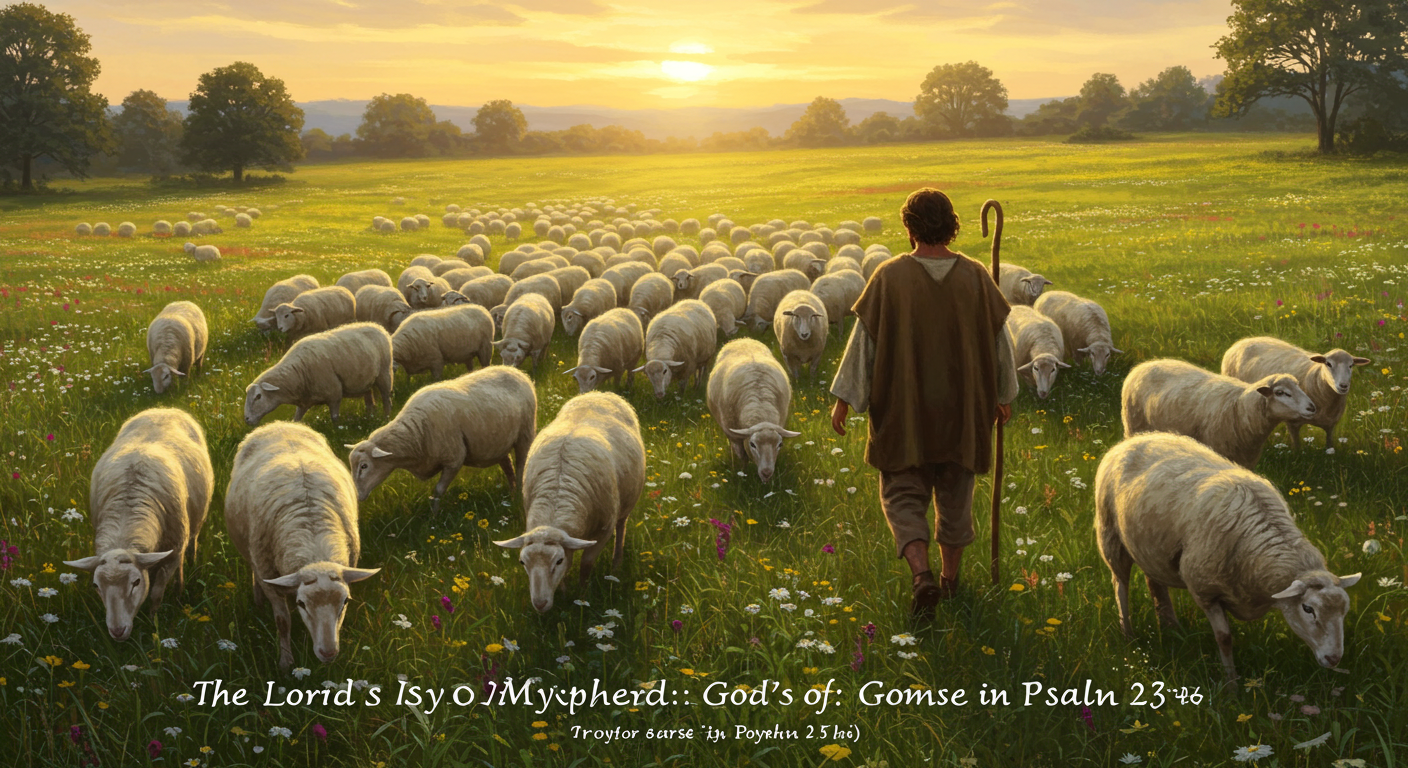The Lord Is My Shepherd: God’s Promise In Psalm 23
Psalm 23 is one of the most beloved passages in Scripture. It comforts you when you’re afraid, steadies you when you’re uncertain, and reassures you when life brings loss or sorrow. When you speak the words “The Lord is my shepherd,” you are claiming a personal, living promise — the Psalm 23 promise — that God cares for you intimately, guides you faithfully, and provides for you fully. In this article you’ll walk through Psalm 23 verse by verse, reflecting on what each line means for your life and how you can live in the assurance of God’s care today.
Introducing the Psalm 23 promise
When David declared, “The Lord is my shepherd,” he used the image of a shepherd to describe the nature of God’s relation to His people. You probably know this psalm by heart: it’s often read at funerals and sung in worship, but its meaning goes far beyond ritual comfort. The Psalm 23 promise is a covenantal assurance that God guides you into rest, restores your soul, leads you in righteousness, and walks with you through the darkest valleys.
Remember that a shepherd in ancient Israel didn’t simply direct sheep from a distance. He guided them to pasture, protected them from wolves, searched for strays, and carried the lambs. When you claim the Psalm 23 promise, you are inviting the Shepherd into every part of your life — the mundane and the momentous, the secure and the scary.
A word on sources and translation
When I quote Scripture below, I’ll reference the New International Version (NIV) on Bible Gateway so you can read each verse in context and study the surrounding chapters if you wish. Each verse link will take you to the NIV text so you can see the full passage for yourself.
Verse 1 — “The Lord is my shepherd; I shall not want.”
Read the verse: Psalm 23:1
This opening line is both a confession and a declaration of dependence. When you say, “The Lord is my shepherd,” you are acknowledging that God is your guide and your provider. The phrase “I shall not want” doesn’t mean you’ll never desire anything; it means you will lack nothing that is essential because your Shepherd secures what you truly need.
Application: If you’re anxious about material needs, relationships, or direction, let this verse remind you that God’s care precedes your worry. You can trust Him to provide for your soul’s deepest needs: forgiveness, peace, purpose, and hope. Practically, let this assurance guide your decisions — you live differently when you believe your Shepherd provides. You become more generous, less consumed by fear, and more willing to follow His leading.
Scriptural support: The care of the Shepherd connects with New Testament promises of provision. See Philippians 4:19 for the reassurance that God will meet your needs according to His riches in Christ Jesus.
Verse 2 — “He makes me lie down in green pastures. He leads me beside still waters.”
Read the verse: Psalm 23:2
Here, David paints a picture of rest and renewal. The Shepherd leads the sheep to green pastures and calm waters — places of restoration and refreshment. For you, this is spiritual rest: a place where your soul can be revitalized by God’s presence.
Application: The Psalm 23 promise in this verse invites you into Sabbath rhythms and spiritual practices that restore you: prayer, Scripture reading, worship, and quiet time with God. If life has worn you down, ask the Shepherd to lead you to places — physical or spiritual — where you can rest. You might need to step away from constant busyness, set boundaries, or intentionally pursue quietness so you can hear His voice.
Practical step: Create a rhythm of rest in your week. Let your Shepherd lead you to times of stillness so your heart can be refreshed and your perspective renewed.
Verse 3 — “He restores my soul. He leads me in paths of righteousness for his name’s sake.”
Read the verse: Psalm 23:3
Restoration is more than physical rest. To have your soul restored means God heals and renews your inner life — your emotions, your conscience, and your sense of spiritual direction. The Shepherd leads you in paths of righteousness, not so that you earn favor, but “for his name’s sake” — God’s actions display His character and faithfulness.
Application: When guilt or regret haunts you, remember the Psalm 23 promise that God restores your soul. Confess, receive His forgiveness, and walk forward in obedience. You don’t follow God to earn love; you follow because He has already loved you. This verse assures you that He shapes your character as He guides your steps.
Scriptural support: Jesus, the Good Shepherd, came to seek and save the lost and to restore the broken (see John 10:11). When you trust in Him, restoration is part of the promise.
Verse 4 — “Even though I walk through the valley of the shadow of death, I will fear no evil, for you are with me; your rod and your staff, they comfort me.”
Read the verse: Psalm 23:4
This verse brings the Psalm into the realities of suffering and danger. The “valley of the shadow of death” is a metaphor for the darkest times of life — loss, depression, illness, or persecution. The promise here is not that you’ll never walk through such valleys, but that you won’t walk through them alone.
Application: When fear presses in, you can claim the Psalm 23 promise: God is with you. The “rod” and “staff” are tools a shepherd uses to protect and guide. They remind you that God disciplines with love, defends you from harm, and directs your steps through the shadows. Practically, in times of crisis, rely on prayer, the support of your faith community, Scripture, and pastoral care. These are ways the Shepherd ministers to you.
Encouragement: You may still experience sorrow, but fear loses its finality when you know the Shepherd walks with you. Hold on to that promise and let it steady your heart.

Verse 5 — “You prepare a table before me in the presence of my enemies; you anoint my head with oil; my cup overflows.”
Read the verse: Psalm 23:5
This verse moves from protection to blessing. In the ancient Near East, preparing a table and anointing with oil were signs of honor, hospitality, and abundance. Even when opponents circle or life feels threatening, God publicly honors you and causes your cup to overflow.
Application: The Psalm 23 promise here reassures you that God provides dignity and blessing even amid trials. He not only protects but also blesses you in a way that defies your circumstances. When your enemies — whether external opposition, inner doubts, or destructive habits — surround you, God prepares a feast in your presence. Your life becomes a testimony that His grace is greater than your struggle.
Practical note: An overflowing cup suggests abundance to share. When you experience God’s provision, be intentional about generosity. Let the overflow bless others and point them to the Shepherd.
Verse 6 — “Surely goodness and mercy shall follow me all the days of my life, and I shall dwell in the house of the Lord forever.”
Read the verse: Psalm 23:6
The psalm closes with a confident proclamation: goodness and mercy will pursue you. The idea of dwelling in the Lord’s house forever speaks to both present fellowship with God and future hope — eternal life in His presence.
Application: The Psalm 23 promise is not temporary. It’s a lifelong companion and an eternal guarantee. If fear whispers that God will leave you, this verse answers with certainty: His goodness and steadfast love pursue you every day. Your future is secure in the Shepherd’s care.
Hope for today and tomorrow: Let this truth shape your decisions, your values, and your response to suffering. Live now in the confidence that you belong to God and will dwell with Him forever.
The Shepherd’s character: what the Psalm 23 promise reveals about God
The Psalm 23 promise reveals multiple attributes of God: He is provider, restorer, guide, protector, host, and faithful companion. Each image in the psalm points to a facet of His nature you can rely on.
You are not dealing with an indifferent deity but a personal Shepherd who knows your needs, understands your heart, and enters into your suffering. This intimacy forms the foundation of Christian assurance. When Jesus called Himself the Good Shepherd, He invited you into this same personal relationship. See John 10:14–15 for how Jesus describes His shepherding love.
How to claim the Psalm 23 promise in your daily life
Claiming the Psalm 23 promise is less about reciting words and more about living trust. Here are practical ways to anchor yourself in this promise:
- Practice daily dependence: Start each day acknowledging God as your Shepherd and asking Him to lead you.
- Rest regularly: Build rhythms of Sabbath and renewal into your schedule; allow God to restore you.
- Walk in obedience: Let the Shepherd lead you in paths of righteousness through Scripture and prayer.
- Seek community: Share burdens and blessings with fellow believers who can remind you of God’s care.
- Remember past faithfulness: Reflect on times God has guided and provided; let memory strengthen your faith.
These practices keep you tuned to the Shepherd’s voice and help you experience the Psalm 23 promise in ordinary life.
Facing doubt: when the Psalm 23 promise feels distant
You may sometimes feel that God’s presence is absent — especially in suffering. Doubt is a common human response, and the psalm doesn’t promise you’ll never doubt. Instead, it gives you language to move through doubt toward faith.
If the Psalm 23 promise feels distant:
- Be honest with God: Psalmists often pour out their fears and questions before God; you can too.
- Rehearse God’s promises: Read Scripture that affirms God’s presence and faithfulness.
- Seek support: Talk with trusted believers, pastors, or counselors who can pray with you and point you back to God’s truth.
Faith grows not by avoiding doubt but by walking through it with God as your Shepherd.
The Shepherd and suffering: why God allows valleys
One of the hardest questions is why a loving Shepherd allows you to walk through the valley of the shadow of death. Two biblical insights help:
- Growth through suffering: Trials often shape you, deepen your faith, and develop perseverance. Romans 5:3–5 (see Romans 5:3-5) explains how suffering produces character and hope.
- Presence in pain: God’s presence does not eliminate suffering, but it changes suffering’s meaning. The Shepherd walks with you, bringing comfort, strength, and ultimately purpose.
When you cannot see God’s hand, trust His heart. He allows valleys but never abandons you in them.
The Good Shepherd and the ultimate Psalm 23 promise
Jesus is the fulfillment of the Psalm 23 promise. He declared Himself the Good Shepherd who lays down His life for the sheep. In Him you find not just guidance and provision but redemption, restoration, and eternal life. See John 10:11 where Jesus says, “I am the good shepherd. The good shepherd lays down his life for the sheep.”
When you trust Christ, the Psalm 23 promise becomes part of the gospel experience: you receive forgiveness, the Holy Spirit’s presence, and the promise of eternal dwelling with God. This is the hope that undergirds all other comforts.
Living out the Psalm 23 promise in relationships
The way you relate to others can reflect whether you’ve embraced the Psalm 23 promise. A person who knows the Shepherd’s care tends to show compassion, patience, and generosity.
Application: In your family, workplace, and community, ask God to shape your actions. Let the Shepherd’s guidance make you a peacemaker, a faithful friend, and a person who serves without seeking return. Your life should point others to the God who restores and sustains you.
Practical suggestion: Look for one person this week you can encourage or help materially or spiritually — let your overflow be an expression of the Psalm 23 promise.
The Psalm 23 promise and Christian leadership
Leaders, pastors, and elders can learn from the shepherding image: leadership in the church is service, not dominion. If you lead others, the Psalm 23 promise calls you to care personally for those entrusted to you.
Application: Model shepherding by listening, protecting, providing spiritually, and guiding people toward righteousness. Leadership rooted in the Psalm 23 promise will prioritize the flock’s well-being over personal ambition.
Scriptural model: Jesus’ leadership was sacrificial. Study His example in Matthew 20:28 where He teaches servant leadership.
When your cup seems empty: receiving God’s overflowing blessing
Sometimes you’ll feel spiritually dry, as though your cup is empty. Psalm 23 promises not a drip but an overflowing cup. How do you receive that blessing again?
- Confess and repent where needed.
- Return to the Word of God for nourishment.
- Reconnect with worship and prayer.
- Serve others; blessing often flows as you give it away.
Remember the Psalm 23 promise: God’s provision can replenish you in ways you don’t expect. Be open to His restoring work.
The Psalm 23 promise and eternity
The psalm’s closing line — dwelling in the house of the Lord forever — points you toward eternity. Christian hope is not merely wishful thinking but grounded in God’s covenant. The promise of dwelling with God forever gives perspective to your present trials.
Application: Live with eternity in view. Make choices that reflect the reality that you belong to God forever. This perspective softens the sting of loss and sharpens your calling to love God and neighbor now.
Scriptural reinforcement: The New Testament speaks of the believer’s eternal dwelling with God. See 1 Peter 1:3-5 for the living hope you have through Jesus’ resurrection.
How to pray Psalm 23 back to God
Prayer is a natural response to the Psalm 23 promise. Here’s a pattern you can use to pray the psalm personally:
- Acknowledge God as your Shepherd (confession and dependence).
- Thank Him for past provision and moments of restoration.
- Ask Him to lead you to rest and renewal today.
- Seek His protection and comfort in valleys you face.
- Pray for an overflowing heart that shares His blessing.
- Express hope in dwelling with Him forever.
Praying the psalm helps you internalize its truth and makes the Psalm 23 promise your lived reality.
Questions people ask about Psalm 23
You might have specific questions as you meditate on this psalm. Here are a few common ones and brief responses:
- Does Psalm 23 promise material wealth? No; it promises spiritual provision and God’s care for your true needs. See Matthew 6:33 for the priority of God’s kingdom over material concerns.
- Is walking through the valley a sign of God’s displeasure? Not necessarily. Suffering can be permitted for growth, protection, or the development of character. God’s presence in the valley is the comfort.
- How does the promise apply to non-Christians? The psalm reveals God’s heart of care, but the fullness of the Psalm 23 promise — especially dwelling in God’s house forever — is realized through faith in Christ. See John 14:6.
If you have other questions, bring them into prayer and Scripture study, and seek pastoral guidance.
Practical ways to memorize and meditate on Psalm 23
Memorizing Scripture gives you spiritual resources for every season:
- Break the psalm into small sections and memorize one line a day.
- Set the verses to music or rhythm; many find this helpful.
- Use the psalm as a bedtime prayer or morning declaration.
- Reflect on one verse for a week, asking how the Psalm 23 promise applies.
As you internalize the psalm, it becomes a working part of your faith life when trials come.
Testimonies: real-life echoes of the Psalm 23 promise
Across generations, people have found Psalm 23 to be a living word. Someone facing terminal illness finds peace in “I will fear no evil.” A family who lost a loved one experiences “goodness and mercy shall follow me” as neighbors and church friends show tangible love. A young adult, anxious about vocation, experiences restoration when God leads them to “green pastures.”
These testimonies remind you that the Psalm 23 promise is not abstract. It is practical, present, and transformative.
Passing the Psalm 23 promise to the next generation
If you have children or mentor younger believers, share the psalm with them. Teach them to see God as Shepherd early in life.
Practical ideas:
- Pray the psalm with your family.
- Read and explain one verse nightly until it’s familiar.
- Model dependence on God so they learn to trust Him themselves.
Passing on this promise equips the next generation with a foundation of faith.
When the Psalm 23 promise feels most needed
The Psalm 23 promise is especially precious in moments of loss, fear, and transition: the death of a loved one, a job loss, a health crisis, or a spiritual turning point. In those moments, return to the psalm and let its images speak to your heart.
Remember, the Shepherd does not promise immunity from pain, but He promises presence, restoration, and a future with Him.
A pastoral invitation: surrender to the Shepherd
If you’ve read this far and realize you don’t have a personal relationship with Jesus, this is the heart of the Psalm 23 promise offered to you. The Shepherd calls to the lost, the weary, and the searching. You don’t have to earn His care; you receive it by faith.
If you want to surrender to Jesus:
- Confess your need for Him.
- Believe that He died and rose for your salvation.
- Commit to follow Him as your Shepherd.
If you want help taking that step, reach out to a pastor or a trusted Christian friend. They will gladly walk with you and pray with you.
The lasting power of the Psalm 23 promise
Centuries after David penned these words, the psalm still brings solace and courage. The Psalm 23 promise endures because it rests on God’s unchanging character. Your Shepherd is faithful. He is the same yesterday, today, and tomorrow. Therefore, you can place your life in His hands with confidence.
Let the psalm shape your worship, your obedience, your hope, and your service. When you live under the Shepherd’s care, everything else is put into its proper perspective.
Final encouragement
You might be walking through a valley right now, or you might be seated beside still waters. Either way, the Psalm 23 promise is for you. Make the words of the psalm your daily conversation with God. Let them steady you in trouble, renew you in weariness, and lead you into joyful obedience.
If you’ll let the Shepherd lead, He will guide you, protect you, and lavish you with His goodness and mercy — all the days of your life.
If you’d like to read Psalm 23 in full right now, follow this link: Psalm 23 (NIV).
Explore More
For further reading and encouragement, check out these posts:
👉 7 Bible Verses About Faith in Hard Times
👉 Job’s Faith: What We Can Learn From His Trials
👉 How To Trust God When Everything Falls Apart
👉 Why God Allows Suffering – A Biblical Perspective
👉 Faith Over Fear: How To Stand Strong In Uncertain Seasons
👉 How To Encourage Someone Struggling With Their Faith
👉 5 Prayers for Strength When You’re Feeling Weak

📘 Jesus and the Woman Caught in Adultery – Grace and Mercy Over Judgement
A powerful retelling of John 8:1-11. This book brings to life the depth of forgiveness, mercy, and God’s unwavering love.
👉 Check it now on Amazon
As a ClickBank & Amazon Affiliate, I earn from qualifying purchases.
Acknowledgment: All Bible verses referenced in this article were accessed via Bible Gateway (or Bible Hub).
“Want to explore more? Check out our latest post on Why Jesus? and discover the life-changing truth of the Gospel!”








